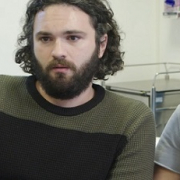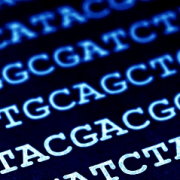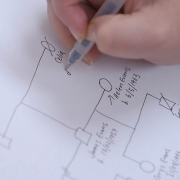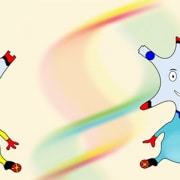Six benefits to helping your patient access genetic counselling
For Genetic Counsellor Awareness Day 2024, NHS genetic counsellor Lily Barnett makes the case for why healthcare colleagues should make use of her profession’s expertise
If you’ve clicked onto (or been sent) this blog post, then you’re probably a healthcare professional who may not know what exactly is a genetic counsellor (informally called a GC). Perhaps you have a hesitation about when, and how, to refer a patient to genetic counselling. Or you’ve heard of genetic counsellors and have a general idea of what they do in the clinic, but have wondered what they can do to support you and your patients.
If this sounds like you, then read on to find out more about genetic counsellors as well as how they support healthcare professionals and patients to understand genetics, genomics and rare disease.
What is a genetic counsellor?
Simply put, genetic counsellors are highly skilled healthcare professionals trained to support patients and families to navigate and adapt to genetic contributions to disease. They work with patients at any stage of life and can order genomic tests and discuss test results clearly, compassionately and with sensitivity. GCs may be generalists or specialise, for example in inherited cardiac conditions or adult cancer. If you want to learn more, then Anna Middleton and colleagues published a particularly good overview of what GCs do in the UK.
Why should a genetic counsellor see your patient?
Whether in primary care or secondary care, when you facilitate patient referral, a GC can offer support in a range of ways.
1. Provide emotional support throughout genomic testing
GCs provide the time, space and support to patients to better prepare them for the emotional impact of the genomic test result. Imagine finding out that, yes, you have a genetic condition but it’s low penetrance so its severity is uncertain; or no, you don’t have it but there’s an incidental finding for something else. Patients can feel uncertain, anxious or confused. A GC is able to prepare the patient for possible outcomes of a genomic test, including any unexpected results, and (if needed) refer them onwards to psychological support.
2. Support the patient to come to terms with and adjust to a genetic diagnosis
When a patient or a patient’s family secures a diagnosis, which may have taken years in the case of a rare disease, they can feel a complicated mix of thoughts and emotions. GCs can work to help their patient, and also other potentially affected family members, by giving them the opportunity to work things through. In some cases, the GC will signpost them to community or patient groups so they can find others going through similar experiences.
- Learn more: Rare disease education hub
3. Help the patient decide how, when and if family members should be contacted
After confirming a genetic contribution to a patient’s condition, you might instinctively want to bring in the patient’s family members for cascade testing – genomic conditions are said to ‘run in the family’ after all. However, this doesn’t consider the patient’s agency, a family member’s ‘right to not know’, or the social issues that can be tied to such diagnoses. GCs are able to guide and support patients in sharing information with family members and potentially having trickly or emotional conversations with their relatives. In some cases, GCs can provide family letters – here’s an example of such a ‘Dear relative’ letter – to pass on to their family, which can help streamline the cascade genomic testing process.
4. Advise families on reproductive options
For individuals affected with a genomic condition, it’s common to worry or wonder about how this might affect their children. Different individuals will have their own personal feelings and values around the potential of having an affected child, and genetic counsellors can help patients navigate this. GCs can explain the potential outcomes of a pregnancy based on what is known about the condition and its pattern of inheritance. They can also discuss options such as preimplantation genetic testing or prenatal genetic diagnosis. GCs often work closely with prenatal care teams to help support patients during pregnancy.
5. Explain what complex inheritance patterns mean to patients
Understanding and explaining dominant and recessive inheritance is something many clinicians are familiar with. However, when it comes to explaining more complicated concepts – such as penetrance, expressivity, epistasis, uniparental disomy or imprinting – in a way that matters to the patient, it can be hard to find the words. Genetic counsellors are specialised in clearly explaining the nature of a condition and how it is inherited, in a way that puts the patient and their family first.
- From our blog: Do our genes govern our fate?
6. Advocate for patients where they can’t advocate for themselves
Genomic test results can be difficult to interpret. Behind the scenes, clinicians may discuss likely diagnoses and reasonable treatment options. This helps medical teams empower patients with the best available information. During these discussions, a genetic counsellor can act as the voice of the patient, advocating for them and making sure their needs and values are taken into account.
How to make a genetic counsellor referral
If you’re a GP, clinician or other healthcare professional and you’d like a patient to see a GC, then they will generally need to first be referred to one of the 23 NHS clinical genetics services. The referral pathway can be different depending on a variety of factors, so it’s best to contact the service for specific advice. Contact details can be found via our map.
- Genomics resource: GeNotes: Genomics notes for clinicians
Genetic counsellors play an important part in helping patients access and understand genomic testing, which is an increasingly important part of modern healthcare services. To understand how genomics is affecting your own area of practice, head over to our ‘Genomics in healthcare’ free resource.









